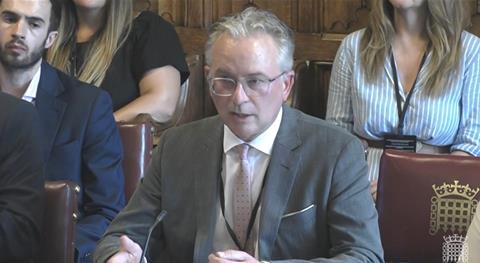John Curtin tells Lords Committee the government’s Plan for Water will resolve problems but implementation timetable is unclear
The interim boss of the Environment Agency has said he doesn’t know how long it will be before housebuilders in areas affected by the nutrient neutrality crisis are told exactly what they can do to enable building to recommence.
John Curtin, interim chief executive of the regulatory agency, told the House of Lords Built Environment Committee that he expected the issues around nutrient pollution in protected watercourses to be resolved through an “integrated” process set out under the government’s “Plan for Water”, published in April.

Curtin said he couldn’t “come up with a number” for how long it will take for the Plan for Water approach to be adopted and implemented. However, he conceded, when pushed, that in the Poole Harbour area, where a similar approach has already been taken, it had taken the best part of a decade to devise an approach which was allowing development to proceed.
Curtin said the Plan for Water was the “key opportunity” to resolve the nutrients crisis, which is estimated by the Home Builders’ Federation to be holding up development of around 120,000 homes in the planning pipeline.
The issue is impacting the sector because the poor condition of 27 protected rivers covering 74 authorities mean that Natural England has advised that all planning permissions for housing in these river catchments would be subject to legal challenge, leading to a de facto hiatus in decision-making.
The developer body says the effect of this will be to reduce annual output by around 43,000 homes a year.
>> See also Government pledges support to help developers deliver ‘nutrient neutral’ sites
>> See also Housebuilders spending up to £25,000 per home on nutrient neutrality fixes
The Plan for Water has been published by the Department of Food and Rural Affairs (Defra) in a bid to transform the management of fresh water in the UK, through the creation of integrated “catchment action plans”. The Environment Agency boss told the Built Environment Committee that the government had now set targets for nutrient loads across each of the river catchments and that Defra “colleagues are working at pace” on an implementation plan for the strategy.
He said this will involve trade offs being worked out, in each catchment, as to how much of the reduction in pollution will have to be delivered by agriculture, how much by improvement of waste water treatment works, and how much by the development sector. He said: “It will look at all of the different interventions in a catchment leading to the target for the improvements that are in the improvement plan set out with government.
“And then we can measure, here’s the reduction happening in sectors X, Y and Z, and set the targets for that catchment, to know where you can unlock and release development. The implementation of the integrated Plan for Water is key to be able to do that.”

Curtin added that the Plan’s implementation was “the key opportunity to ask ’how bold will you be?’” He said: “Do you want to buy X or Y farms to really reduce the nutrient effect there so that you can unlock development? Or do you want a glide path that’s more equitable across all sectors? That will allow you to have those strategic decisions.”
He said the committee would have to write to “Defra officials” to get more detail on the timing of the implementation of the Plan for Water.
However, in response a spokesperson for Defra said there was no single implementation plan for the Plan for Water, and said the Plan was being taken forward on many fronts. The department said in a statement: “We’re working closely with planning authorities affected by nutrient neutrality to provide more support and looking at what more we can do mitigate nutrient pollution. These schemes will deliver clearer routes for developers in tackling nutrient pollution and unlock construction of new sustainable homes.”
The government has said it is already tackling the issue of nutrient neutrality, and has made funding of up to £30m available to local authorities that create schemes which mitigate nutrient pollution and thereby allow development to go ahead. It has asked for expressions of interest in the fund, and is attempting to legislate in the delayed Levelling Up and Regeneration Bill to ensure that water companies invest £2.5bn to upgrade their waste water treatment infrastructure over the next 10 years to reduce pollution.











No comments yet